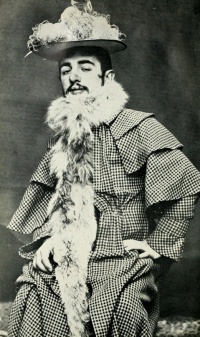Fashion
From The Art and Popular Culture Encyclopedia
| Revision as of 08:43, 22 December 2020 Jahsonic (Talk | contribs) ← Previous diff |
Revision as of 08:47, 22 December 2020 Jahsonic (Talk | contribs) Next diff → |
||
| Line 41: | Line 41: | ||
| * [[Dress code]] | * [[Dress code]] | ||
| * [[Fashion faux pas]] | * [[Fashion faux pas]] | ||
| - | * [[Fashion law]] | ||
| - | * [[Fetish fashion]] | ||
| - | * [[Fitness fashion]] | ||
| * [[History of Western fashion]] | * [[History of Western fashion]] | ||
| - | * [[Index of fashion articles]] | ||
| - | * [[Lolita fashion]] | ||
| * [[Modest fashion]] | * [[Modest fashion]] | ||
| - | * [[Punk fashion]] | ||
| * [[Red carpet fashion]] | * [[Red carpet fashion]] | ||
| * [[Suit (clothing)]] | * [[Suit (clothing)]] | ||
| Line 54: | Line 48: | ||
| * [[Trashion]] | * [[Trashion]] | ||
| * [[Western dress codes]] | * [[Western dress codes]] | ||
| - | * [[Women's beachwear fashion]] | ||
| {{GFDL}} | {{GFDL}} | ||
Revision as of 08:47, 22 December 2020

|
"I shop therefore I am" --Barbara Kruger "The pseudoneeds imposed by modern consumerism cannot be opposed by any genuine needs or desires [and] unleashes an unlimited artificiality which overpowers any living desire [which] ends up by falsifying all social life." --Guy Debord, The Society of the Spectacle, thesis 68 |
|
Related e |
|
Featured: |
Fashion is a popular aesthetic expression at a particular period and place and in a specific context, especially in clothing, footwear, lifestyle, accessories, makeup, hairstyle, and body proportions. Whereas a trend often connotes a peculiar aesthetic expression and often lasting shorter than a season, fashion is a distinctive and industry-supported expression traditionally tied to the fashion season and collections. Style is an expression that lasts over many seasons and is often connected to cultural movements and social markers, symbols, class, and culture (ex. Baroque, Rococo, etc.). According to sociologist Pierre Bourdieu, fashion connotes "the latest fashion, the latest difference."
Even though they are often used together, the term fashion differs from clothes and costumes, where the first describes the material and technical garment, whereas the second has been relegated to special senses like fancy-dress or masquerade wear. Fashion instead describes the social and temporal system that "activates" dress as a social signifier in a certain time and context. Philosopher Giorgio Agamben connects fashion to the current intensity of the qualitative moment, to the temporal aspect the Greek called kairos, whereas clothes belong to the quantitative, to what the Greek called Chronos.
Exclusive brands aspire for the label haute couture, but the term is technically limited to members of the Chambre Syndicale de la Haute Couture in Paris. It is more aspirational and inspired by art, culture and movement. It is extremely exclusive in nature.
With increasing mass-production of consumer commodities at lower prices, and with global reach, sustainability has become an urgent issue amongst politicians, brands, and consumers.
Film set in the fashion world
See also
- British fashion
- Conspicuous consumption
- Consumerism
- Fashion photography
- French fashion
- Italian fashion
- Fashionista
- Happiness economics
- Laver's Law
- Michel Clouscard
- Modest fashion
- Street fashion
- Taste (sociology)
- Haute couture
- Female body shape
See also
- Designer clothing
- Dress code
- Fashion faux pas
- History of Western fashion
- Modest fashion
- Red carpet fashion
- Suit (clothing)
- Sustainable fashion
- Trashion
- Western dress codes


